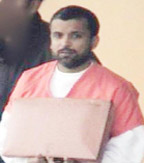-prosecution disagrees
By Oluatoyin Alleyne
in New York
With Roger Khan to be sentenced in a Brooklyn Federal Court tomorrow, the US Government on Tuesday mounted a last-minute bid to convince the presiding judge that the confessed drug trafficker should only get 15 years despite a recommendation by the Probation Department for a longer term.

Khan, whose case has been the cause for much discussion in Guyana and here in New York is set to be sentenced at 2pm.
In a letter to Judge Dora Irizarry, US State Attorney Benton Campbell, yesterday said that the government “respectfully disagrees” with the Probation Department’s sentencing recommendation in its Second Addendum to the Pre-sentence Report for Khan.
While the probation report and the sentencing recommendation is not available for public viewing, from all indications the probation department has recommended that Khan be sentenced to more than 15 years in prison.
“As the Court is aware, this prosecution involved a variety of complex evidentiary issues. Further, because of the attendant privilege issues related to this prosecution, the government expended substantial resources in this matter,” Campbell said in the brief letter. Campbell also referred to the reasons set out by the US government in a letter to the judge on September 29.
Legal observers say that the US government’s insistence on 15 years could signal that the plea bargain deal with Khan possibly covers testimony in other cases. Such a commitment could be withdrawn if the sentence on Khan was higher than the agreed deal of 15 years.
Even as Campbell argues for Khan to be given 15 years, if Judge Irizarry is to listen to many Guyanese in the downtown Brooklyn area then the drug dealer would get much more than that.
Some persons Stabroek News caught up with in the Flat Bush area said that Khan should get a long sentence as he not only trafficked in drugs but was connected to a group fingered in the killing of many persons in Guyana.
“Fifteen years, he should not get fifteen years more like fifty years,” one man said as he indicated he has every intention to be in court to see Khan get sentenced. Khan has never been charged in relation to any murders though in the pre-plea bargain proceedings in New York there had been allegations in court of his involvement in several murders.
“I don’t want to depend on the media I want to hear what the judge say and also see Khan, he cause many people to cry for them children,” he added.
But it is a totally different scenario on Liberty Avenue in Queens, New York. While most of the persons approached by Stabroek News refused to discuss the issue, some even ignoring this reporter, others would only briefly say that Khan saved Guyana.
According to one man if was not for Khan then Guyana would have “gone down the drain.” He would not go into details but said the US should not have “kidnapped Khan” and bring him to the US. Instead he should have been left to continue the “good things he started.”
In the September letter, Campbell had said that the government agreed to a plea bargain with Khan in part to protect information about other targets of the investigation.
He had also said the plea agreement helped them to protect information from cooperating witnesses about the other targets.
In March Khan pleaded guilty to three charges, being conspiring to import cocaine into the US, conspiring to obstruct justice and being a felon in possession of a firearm. The plea agreement stipulates a sentence of 15 years imprisonment, five years supervised release, a $300 special assessment as well as any fine and restitution to be imposed in keeping with the law.
While back in March Judge Irizarry had accepted Khan’s plea, she had stated that she has the final say on how many years he serves. One person, the cousin of slain TV talk show host Ronald Waddell, has objected to the sentence, calling it too lenient for Khan’s crimes in Guyana. Khan was alleged to have been linked to the murder of Waddell.
While noting that the agreed upon sentence is below the applicable life sentence, Campbell had defended it, explaining that the disposition of the case without the need for a lengthy or costly trial would conserve substantial judicial and US government resources, while avoiding litigation risks for both sides. He noted that the US Government had anticipated calling numerous witnesses at the narcotics trial, many of whom are Guyanese citizens. In anticipation, the prosecution took steps to protect the witnesses from retaliation or intimidation by not disclosing their identities to the extent possible, relocating certain individuals and delaying or avoiding deportations to Guyana.
Observers say the probation department’s views might also have been shaped by court testimony about witness tampering charges against Khan and that he headed a brutal, continuing criminal enterprise. At one stage the court had agreed on an anonymous jury for Khan’s case considering the concerns about the nature of the criminal enterprise that he was associated with.
